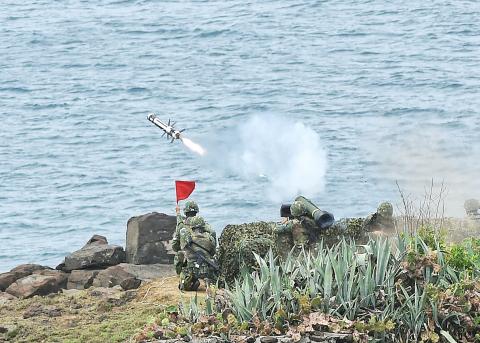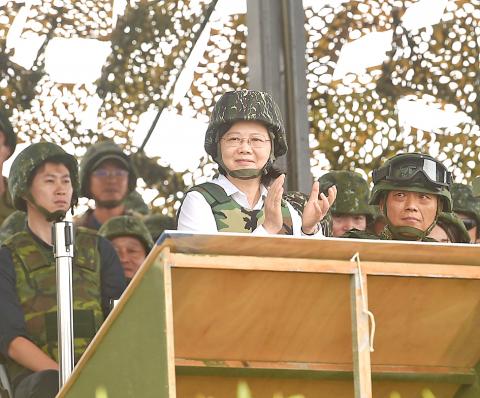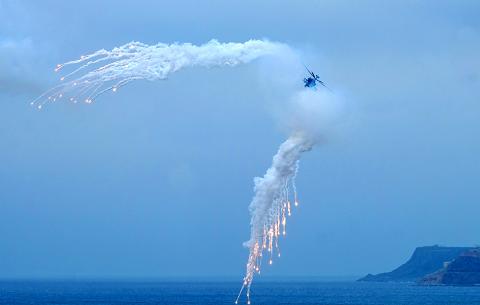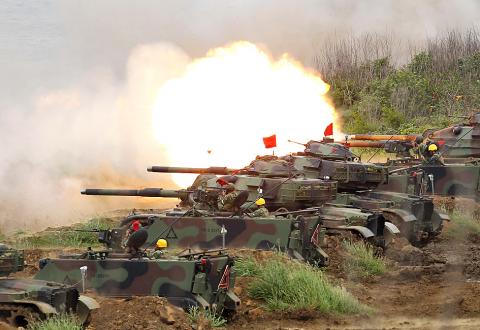The armed forces yesterday conducted a live-fire exercise in the Penghu islands, concluding the main part of the 33rd annual Han Kuang military exercises, with President Tsai Ing-wen (蔡英文) observing the drill which simulated a landing attempt by China’s People’s Liberation Army (PLA).
The scenario involved a landing by the PLA, with the nation’s armed forces launching an operation to repel the attack.
The Marine Corps acting as PLA troops launched an amphibious assault, with a naval formation of Keelung-class destroyers, a Tuo Chiang-class stealth corvette and Kuang Hua VI fast-attack missile boats providing covering fire.

Photo: Fang Pin-chao, Taipei Times
The air force then launched the first wave of counterattack, with a group of fighter jets firing missiles at target areas at sea, and the army mobilized attack helicopters, tanks and infantry units, and launched an artillery barrage against landing troops.
More than 3,900 soldiers, sailors, airmen and marines participated in the exercise, and weapons and equipment used in the drill included F-16 jets, Indigenous Defense Fighters, AH-64E Apache helicopters, UH-60M Blackhawk helicopters, CH-47 Chinook transport helicopters, RT-2000 multiple launch rocket systems, M60A3 tanks, 155mm and 105mm howitzers, and other light weapons.
Tsai praised the performance of the armed forces, saying the drill was necessary to ensure national safety and the well-being of Taiwanese.

Photo: Fang Pin-chao, Taipei Times
The president reiterated her pledge to build the nation’s defense capabilities with locally developed weapons, including submarines, surface vessels and trainer jets.
The government would raise the nation’s research and manufacturing capabilities to develop necessary weapons, which could boost the local defense sector and the business environment as a whole, Tsai said.
“The most important thing in achieving defensive self-sufficiency is to show the world that Taiwan is determined to defend itself,” Tsai said.

Photo: AFP/Sam Yeh
“As the commander-in-chief, I am the most reliable supporter of the armed forces. The government will fully support the military in either reforming national defense or improving the working conditions for military personnel,” she said.
Yesterday was the fourth day of this year’s Han Kuang exercises, the first such event since the Ministry of National Defense changed the nation’s defense strategy from “effective deterrence” to “multi-layered deterrence.”
Although the content shared with the media showed a traditional live-fire drill, there were electronic warfare operations involved, suggesting the military’s awareness to adapt to changes in battle strategies and tactics, Ministry of National Defense spokesman Major General Chen Chung-chi (陳中吉) said.

Photo: AP/Chiang Ying-ying
Today is the last day of this year’s drill, simulating a Chinese attack on the Ching Chuan Kang (清泉崗) air base in Taichung.
The response to the simulated attack is to involve all branches of the armed forces, including fighter jets and surface-to-air missiles.

US President Donald Trump yesterday announced sweeping "reciprocal tariffs" on US trading partners, including a 32 percent tax on goods from Taiwan that is set to take effect on Wednesday. At a Rose Garden event, Trump declared a 10 percent baseline tax on imports from all countries, with the White House saying it would take effect on Saturday. Countries with larger trade surpluses with the US would face higher duties beginning on Wednesday, including Taiwan (32 percent), China (34 percent), Japan (24 percent), South Korea (25 percent), Vietnam (46 percent) and Thailand (36 percent). Canada and Mexico, the two largest US trading

AIR SUPPORT: The Ministry of National Defense thanked the US for the delivery, adding that it was an indicator of the White House’s commitment to the Taiwan Relations Act Deputy Minister of National Defense Po Horng-huei (柏鴻輝) and Representative to the US Alexander Yui on Friday attended a delivery ceremony for the first of Taiwan’s long-awaited 66 F-16C/D Block 70 jets at a Lockheed Martin Corp factory in Greenville, South Carolina. “We are so proud to be the global home of the F-16 and to support Taiwan’s air defense capabilities,” US Representative William Timmons wrote on X, alongside a photograph of Taiwanese and US officials at the event. The F-16C/D Block 70 jets Taiwan ordered have the same capabilities as aircraft that had been upgraded to F-16Vs. The batch of Lockheed Martin

GRIDLOCK: The National Fire Agency’s Special Search and Rescue team is on standby to travel to the countries to help out with the rescue effort A powerful earthquake rocked Myanmar and neighboring Thailand yesterday, killing at least three people in Bangkok and burying dozens when a high-rise building under construction collapsed. Footage shared on social media from Myanmar’s second-largest city showed widespread destruction, raising fears that many were trapped under the rubble or killed. The magnitude 7.7 earthquake, with an epicenter near Mandalay in Myanmar, struck at midday and was followed by a strong magnitude 6.4 aftershock. The extent of death, injury and destruction — especially in Myanmar, which is embroiled in a civil war and where information is tightly controlled at the best of times —

China's military today said it began joint army, navy and rocket force exercises around Taiwan to "serve as a stern warning and powerful deterrent against Taiwanese independence," calling President William Lai (賴清德) a "parasite." The exercises come after Lai called Beijing a "foreign hostile force" last month. More than 10 Chinese military ships approached close to Taiwan's 24 nautical mile (44.4km) contiguous zone this morning and Taiwan sent its own warships to respond, two senior Taiwanese officials said. Taiwan has not yet detected any live fire by the Chinese military so far, one of the officials said. The drills took place after US Secretary